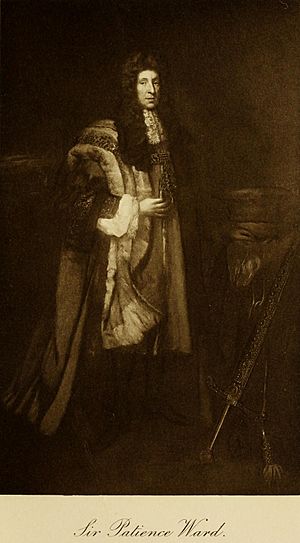Patience Ward facts for kids
Sir Patience Ward (1629–1696) was an important English merchant and politician. He was part of a group called the Whigs, who believed in limiting the king's power. In 1680, he became the Lord Mayor of London. This was a time when the City of London often disagreed with the King of England.
Contents
Early Life and Family Background
Patience Ward was born on December 7, 1629, in Tanshelf, near Pontefract. His parents were Thomas and Elizabeth Ward. He was named Patience because his father had hoped for a daughter. When he was five, his father passed away. His mother raised him, hoping he would become a minister. In 1643, he went to university. However, he soon decided to focus on business instead.
Becoming a Successful Merchant
On June 10, 1646, Patience Ward began an apprenticeship. He trained for eight years with Launcelot Tolson, a merchant-taylor. A merchant-taylor was someone who dealt in cloth and clothing. Tolson was also a merchant-adventurer, meaning he traded goods overseas. Ward lived with Tolson until he got married.
After his training, Ward started his own business. He set up shop in St. Lawrence Pountney Lane in London. He became a freeman of the Merchant Taylors' Company. This was a powerful group for merchants. In 1671, he became the master of this company. This showed he was a respected leader in the business world.
Rising in London Politics
Patience Ward became a sheriff of London in 1670. Sheriffs helped manage the city and its laws. Later that year, he became an alderman for the Farringdon Within area. An alderman was a senior member of the city council.
In 1675, King Charles II attended a special dinner. At this event, Ward and other aldermen were knighted. This meant they received the title "Sir."
Serving as Lord Mayor
In 1680, Sir Patience Ward was chosen as the Lord Mayor of London. This was a very important position. He took office on October 29. In his speech, he spoke strongly about Protestant beliefs. His inauguration was a grand event. The Merchant Taylors' Company paid for a magnificent parade.
Sir Patience Ward supported the Protestant cause. He often disagreed with the King's party. He was known for siding with those who wanted more religious freedom.
Disagreements with the King
In 1681, King Charles II ended Parliament. Parliament is like a country's main law-making body. The City of London wanted Parliament to meet again. They wanted laws to protect the King and the people.
Sir Patience Ward had the difficult job of telling the King this. The King did not like this message. He told Ward and his group to "mind their own business." Despite this, Ward received thanks from the city for his efforts.
During his time as mayor, an extra message was added to the Monument to the Great Fire of London. This message said that the Great Fire of London was caused by Catholics. This showed the strong anti-Catholic feelings in the city at that time.
Losing Influence
The King's supporters began to gain power in London. Sir Patience Ward lost his role as a colonel in the city's trained bands. These were like local citizen militias. After his term, Sir John Moore, a supporter of the King, became the next Lord Mayor. This happened after a close election.
Life in Exile
In 1682, Sir Patience Ward became a member of the Royal Society. This was a group for important scientists and thinkers.
Accusation and Flight
In 1683, Sir Patience Ward faced a serious accusation. He was accused of not telling the full truth in a court case. This case involved James, Duke of York, who was the King's brother. The Duke had sued another person for speaking badly about him.
After a trial, Ward was found guilty. To avoid punishment, he had to leave England. He went to live in Holland. While in exile, he stayed in touch with other English exiles.
Return to England
In 1688, things changed in England. King James II (the former Duke of York) was replaced by William III. This event is known as the Glorious Revolution. William III's arrival meant Sir Patience Ward could return home. He received a pardon for his past conviction.
Under King William III
With William III as king, Sir Patience Ward was back in favor. In 1689, he was elected as one of London's representatives in Parliament. He also became a colonel again in the trained bands. On April 19, he was made a commissioner for managing customs. This meant he helped collect taxes on goods coming into the country.
He briefly lost his colonelcy in 1690 but got it back in 1691. In 1696, he became ill and had to leave his customs job. However, he recovered enough to return to work.
Sir Patience Ward passed away on July 10, 1696. He was buried in St Mary Abchurch in London. A monument was placed there to remember him.
Family Life
Sir Patience Ward married Elizabeth Hobson in 1653. She passed away in 1685 while he was in exile. She was buried in Amsterdam. They did not have any children.
Sir Patience Ward left his family estate, Hooton Pagnell, to his grand-nephew, also named Patience Ward. His nephew, Sir John Ward, later became Lord Mayor of London in 1714.
Images for kids
 | Kyle Baker |
 | Joseph Yoakum |
 | Laura Wheeler Waring |
 | Henry Ossawa Tanner |



